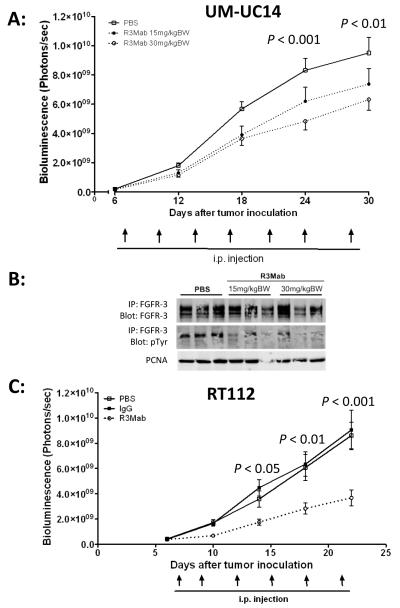Fig. 3.
A: Dose-dependent growth inhibition of orthotopic UM-UC14 xenografts. Constitutively activated, mutant FGFR3S249C harboring UM-UC14 cells were inoculated orthotopically in bladder of nude mice. Mice were subdivided into three treatment arms: IgG control (N=14), R3Mab 15 mg/kgBW (N=13) and R3Mab 30 mg/kgBW (N=13). Systemic, intraperitoneal (i.p.) applied treatment with R3Mab results in a dose-dependent growth inhibition compared to non-specific IgG control treatment. Tumor growth was evaluated by bioluminescent imaging. B: Western blot analysis of tumor samples, derived from orthotopically grown UM-UC14 xenografts after treatment with R3Mab at 15 mg/kgBW and 30 mg/kgBW. Tumors treated with R3Mab demonstrate lower phosphorylation levels indicated by reduced pTyr, while levels of total FGFR3 in the different treatment and control groups are unchanged. C: Tumor growth inhibition of orthotopic RT112 xenografts. Wild-type FGFR3 harboring RT112 cells were inoculated orthotopically in bladder of nude mice. Mice received either 30 mg/kgBW R3Mab (N=15), non-targeting IgG control (N=15) or PBS (N=15) as a negative control. I.p. treatment with R3Mab results in significant inhibition of tumor growth compared to saline treated mice as well as mice in the IgG control arm. Tumor growth was evaluated by bioluminescent imaging.

